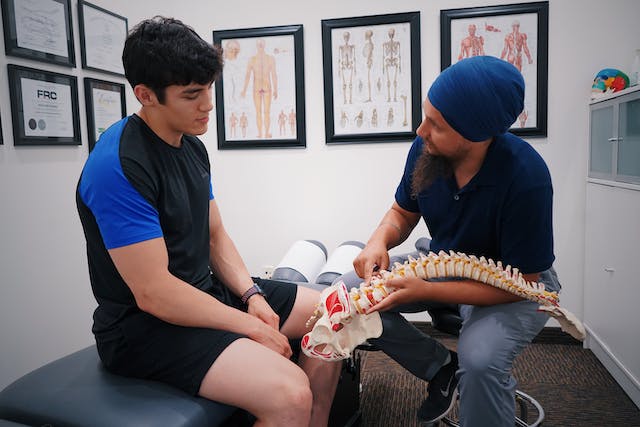As we get older, our bone health becomes increasingly fragile and also important.
Something as simple as slipping and falling on a wet floor can lead to severe injuries if you have poor bone health.
There are preventative measures you can take to keep your bones strong as you age, and the following are key things to know.
The Basics
Around 62% of your bone density comes from genetics. When you’re a teenager, through good nutrition and weight-training, you can build around 90% of your bone density by the time you reach the age of 20. Once you’re 30, you’ve built all the bone you’re going to have.
However, many people don’t start paying attention to their bone health until much further down the road when they’re dealing with problems.
There are estimated to be around 10 million people in the U.S. with osteoporosis, which is discussed more below.
Risk factors for developing bone issues can include certain medicines, like thyroid medicines and corticosteroids. Inflammatory conditions such as bowel disease can also increase the likelihood of bone problems, as can some cancer treatments.
Other risk factors that can affect bone health include alcohol overuse, inactivity, smoking, and having a low intake of certain vitamins and nutrients.
Childhood, adolescence, and early adulthood, as was touched on, are our times of peak bone mass.
When we get to the age of 40, we start to gradually lose bone mass. There are things you can do, especially in terms of diet and exercise, to slow this bone loss and avoid severe problems.
Gender and Bone Mass
Men have more skeletal mass than women during growth, so they have bones that are wider and larger. This means their peak bone mass is greater than women’s.
Women have smaller bones and are more likely to develop osteoporosis.
There’s also another reason that women are more likely to develop osteoporosis—when they reach menopause, their estrogen levels decline. Estrogen is a hormone that helps strengthen bones.
What Exactly Is Osteoporosis?
Osteoporosis means porous bones. It’s a disorder that thins the framework located inside your bones.
Then, even a minor fall can lead to a fracture.
The most common places for fractures when you have osteoporosis are the hip, spine, and wrists.
After the age of 50, one in two women experience bone breaks due to weakening, and one in five men do.
How to Prevent Bone Problems
No matter how old you are, there are things you can do to maintain your existing bone mineral density and prevent osteoporosis.
First, calcium is so important. Calcium intake levels should be 1000 milligrams a day for women who are 50 and younger and for men 70 and younger. For women over the age of 50 and men over 70, aim for at least 1200 milligrams of calcium a day. However, if you have kidney failure, talk to your doctor about the appropriate calcium intake for you.
Foods rich in calcium include milk and yogurt, greens like kale, certain types of beans like white beans, and foods such as orange juice that are fortified with it.
Along with calcium, vitamin D is very important for bone health. Having adequate vitamin D levels helps your body absorb calcium and helps your bones use it. Try to get at least 600 IU of vitamin D a day up to the age of 70. After 70, you need 800 IU a day.
Potassium and protein play a role in bone health too. Potassium can improve your body’s metabolism of calcium, and many adults don’t get enough potassium. Potassium is found in fruits like bananas and vegetables like acorn squash and spinach.
Protein helps your bones stay strong and heal themselves, so make sure you include plenty in your diet.
Reduce your alcohol and calcium intake, and if you smoke, quit.
Finally, exercise helps strengthen not just your muscles and your heart, but it’s also good for your bones. You want to keep your bones strong with physical activity, which can include weight training, walking, or aerobic activity. When you’re working your bones, you’re simply keeping them strong.
If you don’t typically exercise, or you feel like you’re frail, a physical therapist can create a custom plan for you that meets your needs.
If you’re worried about your bone health, talk to your doctor about the steps you can take to stay strong and keep your bones from becoming too brittle.

